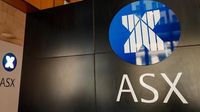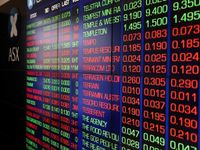The Australian sharemarket declined significantly on March 19, 2025, closing lower amid investor jitters as they awaited the Federal Reserve's monetary policy decision. The ASX200 index fell by 32.10 points to finish at 7,828.30 points, marking a pause in its recent three-day winning streak. The All Ordinaries also noted a slight drop, closing down by 34.60 points to 8,055.30 points. The Australian dollar was trading at approximately 63.58 US cents, reflecting the ongoing market volatility.
In this broad market sell-off, investors noted declines across eight of the 11 sectors. Only the healthcare, telecommunications, and energy sectors managed to post gains. Notably, a fall in iron ore prices back to $101.80 forced significant drops in major mining stocks: BHP dipped 0.15% to $39.56, Rio Tinto fell 0.69% to $118.70, and Fortescue Metals Group saw a 1.02% decline to settle at $16.49.
Attention now turns toward the U.S. Federal Reserve, which is expected to provide insights on its monetary policy during its meeting on March 20, 2025. Investors are keen to glean comments regarding the impact of U.S. tariffs on future economic growth and inflation levels. Markets have been characterized by uncertainty regarding the resilience of the U.S. economy, which analysts believe has shown signs of a downturn in relation to the Fed's shift in approach over the last six weeks.
“The perception for a while was that the U.S. economy was quite resilient, and that further rate cuts may not be required to support the economy overall,” stated Kyle Rodda, a senior financial market analyst at Capital.com. “Obviously that has changed in the last six weeks, we are seeing a sign of a downturn now in the U.S. economic growth with the market hoping that if the downturn starts to gather in pace the Fed is on standby and ready to lower rates.”
This apprehension has resulted in significant losses across other major sectors. Utilities, Listed Real Investment Trusts (A-REITs), and Industrials were heavily sold off as investors adjusted their strategies. Origin Energy shares slumped by 1.94% to $10.60, and AGL Energy witnessed a slight fall of 2.04% to $10.58. The financial sector was no exception, with Commonwealth Bank of Australia (CBA) down 0.99% to $142.77, Westpac slightly declining by 0.20% to $30.12, and ANZ decreasing by 0.55% to $28.72. Surprisingly, National Australia Bank (NAB) was the only major bank to end on a positive note, up 0.18% to $32.65.
Compounding the market's woes were grim prospects from the retail sector, particularly department store Myer, which faced a 1.3% drop in its share price, settling at $0.75. Following the company's announcement of a nearly 40% tumble in net profit for the first half of the financial year, concerns are mounting about rising operational costs. Myer reported a net profit after tax of $30.4 million and flagged a $14 million cost linked to its merger with Premier Investments’s Apparel Brand Division, along with an additional $2.5 million for a strategic review.
In another notable development, the a2 Milk Company saw its shares decrease by 2.5% to $8.32 after Barrenjoey downgraded the stock to “neutral.” This drop occurred despite earlier optimism surrounding a Chinese stimulus package meant to boost birth rates, enhancing demand for dairy products.
As the Australian market reeled, futures trading demonstrated a slight positive sentiment, with ASX 200 futures showing an increase of 53 points, or 0.67%, as of 8:30 a.m. AEDT on March 20, 2025. This uptick in futures could signal a possible rebound as traders await further clarity from the U.S. Fed about future rate cuts, which many expect to occur as the economic outlook remains uncertain.
The Fed, keeping its rates at 4.25% - 4.50% in its latest meeting, hinted at potential economic adjustments with its economic projections that indicated slightly higher inflation expectations and a lowered GDP growth forecast. The Treasury runoff cap was also reduced from $25 billion to $5 billion, and the Fed is anticipating 50 basis points of cuts by the end of 2025, which could further impact Australian markets.
Uncertainty surrounding reciprocal tariffs set to be implemented from April 2 adds to the looming challenges foreign traders and investors face as they navigate through potential market fluctuations. There is a cautious sense in the market as the full implications of these tariffs are yet to become clear.
Investors are also keeping an eye on stock valuations, particularly in leading sectors such as technology and mining. For instance, Brickworks announced that its underlying net profit after tax surged 308% to $76 million, with interim dividends rising by 4% to 25 cents per share. Cleanaway plans to acquire Contract Resources for $377 million, expecting significant annual synergies.
As the Australian stock market sits at a crossroads, the investment sentiment seems poised for potential shifts as results from the Fed's meeting may very well dictate investor behavior in the near term. With rising costs across sectors, cautious optimism remains as traders hope for timely government actions to restore market confidence.






